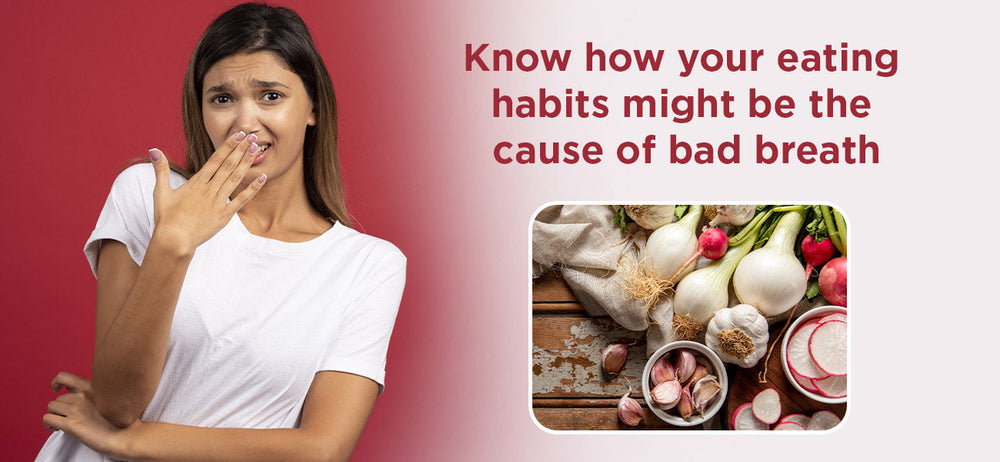Our eating habits can be the cause of our bad breath. Yes, you read it right, one can never think that the food that we eat, and our eating habits are the reason behind bad breath. However, today we will learn about the eating habits-related causes and effective solutions for bad breath. But before that, let us understand a little about bad breath also known as Halitosis in medical terms. Bad breath/Halitosis typically originates in the mouth, where bacteria break down food particles, producing volatile sulphur compounds (VSCs) that have a foul odour. However, systemic conditions, medications, and dietary habits can also contribute to the problem. It is a common condition that can affect anyone at any age. It's often a source of embarrassment and social discomfort. While there are several causes of bad breath, one significant factor is often overlooked: our eating habits.
Certain foods are notorious for causing bad breath. These foods contain compounds that can cause unpleasant odours, either directly or through metabolic processes.
Apart from these foods, our unhealthy eating habits also add to the bad breath in the mouth. While certain eating habits can influence the freshness of your breath, here are some habits to be mindful of:
Unhealthy eating habits which cause bad breath:
➣ Skipping meals, particularly breakfast, can lead to bad breath. Eating stimulates saliva production, which helps cleanse the mouth by washing away food particles and bacteria. Without regular meals, saliva flow decreases, leading to dry mouth and increased bacteria.
➣ Consuming food late at night, especially before bed, can contribute to bad breath. During sleep, saliva production decreases, which means food particles remain in the mouth longer, providing a feast for bacteria. Additionally, late-night eating can increase the risk of gastroesophageal reflux disease (GERD), which can also cause bad breath.
How to get rid of mouth Odour?
There are various ways for preventing bad breath. Just as some foods can cause bad breath, others can help combat it. Incorporating these foods into your diet can help maintain fresher breath.
• Green Tea: Green tea contains polyphenols, which are natural antioxidants that can reduce bacterial growth and neutralize sulphur compounds. Green tea polyphenols effectively reduce bad breath by inhibiting the growth of bacteria that produce foul-smelling compounds. [4]
Role of Water in Preventing Bad Breath
Staying hydrated is crucial for maintaining fresh breath. Water helps rinse away food particles and bacteria, and stimulates saliva production. Saliva is the mouth’s natural defence against bad breath, as it neutralizes acids and washes away debris. Dehydration can lead to dry mouth, or xerostomia, which is a significant cause of bad breath. Without adequate saliva, bacteria can thrive, leading to an increase in VSCs. One has to maintain good hydration to lower the levels of VSCs in one breath.
Oral Health and Hygiene Practices to Complement Dietary Changes [5]
While diet plays a crucial role in maintaining fresh breath, it must be combined with good oral hygiene practices to be effective.
-
Use of Mouthwash: The use of antiseptic mouthwash containing essential oils and chemical compounds can directly oxidize VSCs to non-malodorous products and is capable of killing odour-causing microorganisms, thereby reducing bad breath. [2]
Tips for Managing Bad Breath Through Diet
To manage bad breath effectively, consider the following practical dietary tips:
Bad breath can be a distressing condition, but understanding how eating habits contribute to it can help you take control. By being mindful of the foods, you consume and adopting healthier eating habits, you can significantly reduce the likelihood of bad breath. Incorporating foods that promote fresh breath, staying hydrated, and maintaining good oral hygiene are all essential steps toward achieving and maintaining fresh breath. Remember, a balanced diet not only contributes to overall health but also plays a crucial role in oral hygiene and breath freshness.
References
- MB Mishra, Shanu Mishra. Sugar-Sweetened Beverages: General and Oral Health Hazards in Children and Adolescents. Int J Clin Pediatr Dent.2011 May-Aug.
- Lee PP, Mak WY, Newsome P. The aetiology and treatment of oral halitosis: an update. Hong Kong Med J. 2004 Dec;10(6):414-8.
- M Karbalaei. Alleviation of halitosis by use of probiotics and their protective mechanisms in the oral cavity. New Microbes and New Infections Volume 42, July 2021.
- Morin et al. Green tea extract and its major constituent epigallocatechin-3-gallate inhibit growth and halitosis-related properties of Solobacterium moore. BMC Complementary and Alternative Medicine (2015).
- Aung et all. Effectiveness of three oral hygiene regimens on oral malodor reduction: a randomized clinical trial. BioMed Central 2015.


